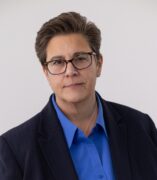
Lisa A. Razzano
Honorable Mention (2023)
Professor of Psychiatry, Department of Psychiatry, College of Medicine
About
Dr. Lisa Razzano, is Professor in the Department of Psychiatry. Since joining the UIC faculty in 1995, Dr. Razzano has demonstrated a unique ability to work with diverse communities focusing community-based research, scholarship, service, and teaching to address critical needs of the LGBTQ+ community and the public health and mental health workforce. Over her 28-year career at the College of Medicine, Dr. Razzano has built other partnerships with key community leaders, including Thresholds, the Chicago Department of Public Health, and the AIDS Foundation of Chicago, among others. She has led multiple community-based research and workforce development programs including training physical- and behavioral healthcare providers within communities affected by HIV/AIDS in partnership with Chicago House and Social Service Agency, a leader within the community. These competitive awards and others supported ground-breaking and lasting innovations within Illinois related to vital areas for HIV recovery, including medication adherence, peer-led services, employment, and housing. As a visible LBGTQ+ faculty member, Dr. Razzano also has been a role model for faculty, staff, and students for almost 3 decades, with a staid commitment to creating safe spaces, furthering scholarship, teaching, and mentoring in this area, and building sustainable collaborations between UIC and the Chicago area LGBTQ+ and other marginalized communities. Along with her long history of exemplary teaching, mentoring, ongoing activities as a member of the tri-campus medical education curriculum, campus course director, and other service to UIC and the community, Dr. Razzano continues to support and develop community research and training programs. These career activities have empowered community members, have a lasting impact on the professional development of the workforce, and continue to influence physical and behavioral health at community-based agencies and universities programs.